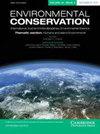Relational values shape people’s connectedness to nature in a former military protected area of Ecuador
IF 2.6
3区 环境科学与生态学
Q2 BIODIVERSITY CONSERVATION
引用次数: 0
Abstract
Relational values are a way of recognizing and valuing the complex and interconnected relationships between people and nature, such as caregiving, place attachment and spiritual meaning, as well as the social and cultural impacts of degradation and environmental and conservation efforts. However, the implications of these values for the management and conservation of protected areas are little known. We explored the role of relational values in shaping local communities’ connectedness to a protected area of Ecuador that had been used by the military in the past and the implications of the values for well-being. Four hundred individual face-to-face surveys in the surroundings of Arenillas Ecological Reserve (south-west Ecuador) indicated high levels of connectedness towards this natural reserve amongst local communities through multiple values of nature. However, relational values were identified as the most prominent value explaining the strength of connectedness to nature, followed by intrinsic and instrumental values. We also showed that combinations of different natural values (instrumental, intrinsic and relational) might explain the support for specific well-being components. Our findings offer understanding of human behaviour towards protected areas with a military past and represent a first step in Ecuador towards comprehending how relational values shape the connectedness of local communities to nature.关系价值观塑造了厄瓜多尔前军事保护区内人们与自然的联系
关系价值观是认识和重视人与自然之间复杂而相互关联的关系的一种方式,例如关爱、对地方的依恋和精神意义,以及退化和环境及保护工作对社会和文化的影响。然而,这些价值观对保护区管理和保护的影响却鲜为人知。我们探讨了关系价值观在塑造当地社区与厄瓜多尔一个过去曾被军队使用的保护区的联系方面所起的作用,以及这些价值观对福祉的影响。在阿雷尼拉斯生态保护区(厄瓜多尔西南部)周边地区进行的 400 次面对面个人调查表明,当地社区通过对自然的多重价值观与该自然保护区建立了高度的联系。然而,关系价值被认为是解释与自然联系强度的最主要价值,其次是内在价值和工具价值。我们还发现,不同自然价值(工具价值、内在价值和关系价值)的组合可以解释对特定幸福要素的支持。我们的研究结果有助于理解人类对具有军事历史的保护区的行为,是厄瓜多尔在理解关系价值观如何塑造当地社区与自然的联系方面迈出的第一步。
本文章由计算机程序翻译,如有差异,请以英文原文为准。
求助全文
约1分钟内获得全文
求助全文
来源期刊

Environmental Conservation
环境科学-环境科学
CiteScore
5.20
自引率
3.70%
发文量
43
审稿时长
>36 weeks
期刊介绍:
Environmental Conservation is one of the longest-standing, most highly-cited of the interdisciplinary environmental science journals. It includes research papers, reports, comments, subject reviews, and book reviews addressing environmental policy, practice, and natural and social science of environmental concern at the global level, informed by rigorous local level case studies. The journal"s scope is very broad, including issues in human institutions, ecosystem change, resource utilisation, terrestrial biomes, aquatic systems, and coastal and land use management. Environmental Conservation is essential reading for all environmentalists, managers, consultants, agency workers and scientists wishing to keep abreast of current developments in environmental science.
 求助内容:
求助内容: 应助结果提醒方式:
应助结果提醒方式:


